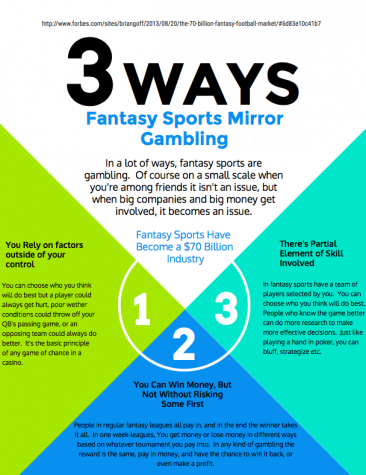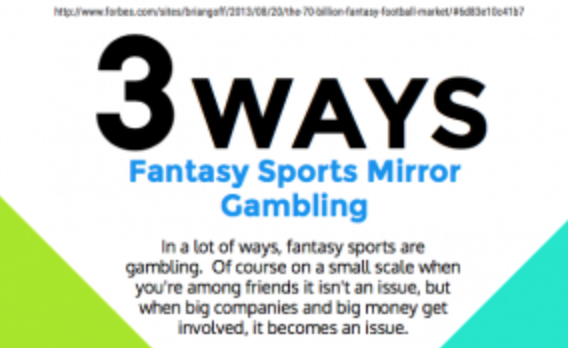Fantasy sports sparks debate, ethical concerns
December 5, 2016

Last year if someone turned on a football game they would be greeted not only with the game itself, but countless ads for online programs such as DraftKings and FanDuel. One week fantasy football leagues that promised big payouts for those able to win, it sound like a great system, until you look a little closer.
FanDuel and DraftKings are not regular fantasy football leagues, they don’t go season by season, and instead they take it one week at a time. Both one-week leagues and small, full season leagues between friends, everyone puts in some money, and in the end the pot goes to the winner. The difference comes down to large companies and the money in fantasy sports leading to greed and exploitation.
This has sparked a debate about where fantasy sports become nothing more than gambling. Many say it’s usually just a fun game between friends, completely ethical, not to mention enjoyable. They also use the argument that it’s a skill based game, the player look at statistics to build the best team possible and the person who is best at it wins. Some take a different route, saying that winning money based on the performance of the players is no different from betting on race horses. This is where the ethics of this industry worth $70 billion on the football side alone become questionable.
There’s a distinct difference between one-week leagues and full season leagues, and not just the obvious difference in time commitment. Full season leagues are set up by groups of friends, they match their chosen teams up against each other in various one-on-one match-ups and develop a record, the person with the best record wins the league. One-week leagues are different, instead of everyone drafting their own unique players.
In one-week leagues someone can draft anyone in the league they want, trying to put together the best team possible. Instead of competing with other league members for players, the salary cap is what keeps a team in check. In these leagues each player has a specific price each week. The price is based on how well he has played this far in the season. Someone can buy into the league for a set price and get $60,000 in game, and from there they must build the best team possible while staying under or exactly on your budget.
There’s also a difference between how these leagues decide who wins the money in the end, in full season leagues it all generally just goes to the team with the best record, but in one week leagues it gets more complex. There are different tournaments you can enter that decide how much money you get in different ways, some award the top 50 percent of teams money and some tournaments are winner take all, it all depends on how much risk the player wants, and how much of a reward you want. The biggest dig against one-week leagues is that not all of the money goes to the winners, a small percent is kept as profit for the company putting it all together.
That is where people have an issue, full season leagues aren’t usually criticized because even if it is technically gambling, it is protected under laws that allow gambling if there is no organization skimming profit off the top, poker night with friends, playful bets, etc. One-week leagues lose this protection when companies like FanDuel and DraftKings make their profit off of entry fees, at that point participants are simply betting on players no differently than people sitting around a race track betting on horses, and the the companies organizing it all become massive, glorified bookies.
Another comparison that can be made is that ultimately, fantasy sports are a game of chance. When giving his thoughts on what amount of fantasy is actually skill, Junior Leo Montie said, “I would say in fantasy sports it’s about 25 percent skill, 75 percent luck. You never know what players will be the best.”
This ultimately unethical practice has been banned by five states and officially accepted by only 12, the rest are pending legislation. In the end it comes down to leagues among friends are harmless and small scale, while the truly unethical behavior comes from the large one-week fantasy companies, exploiting athletes for profit. There’s nothing wrong with friendly betting and following your favorite professional sports league but as it all to often does, greed takes things too far, and companies turn a fun activity into an exploitation, and that is where ethics ultimately go down the drain.

Travis Jacobson • Jan 18, 2017 at 12:34 pm
This is a very good article. The statistics are strong and the quotes are well done. The graphic is also very easy to understand and easy to follow.
Hunter Hippel • Jan 9, 2017 at 3:32 pm
Good article. I think people should be able to do whatever they want, especially when it comes to betting and fantasy sports. My problem is with the NFL’s stance on this. They’re so against gambling and everything yet have stock in companies like Fanduel and Draft Kings.
Adam Humpal • Jan 1, 2017 at 11:46 am
I like how the article took a lot of time to present facts, to give a good background on the issue, and then that all builds up to create a very strong conclusion. Although there is only one interview/peer based quote it is very strong, though it would have been nice to see more sources cited in the article to improved credibility.